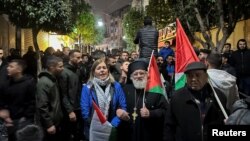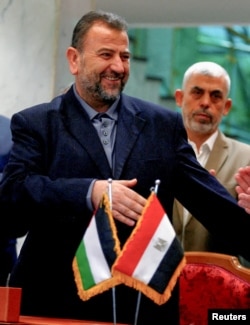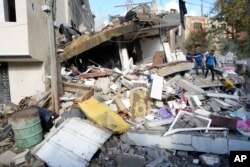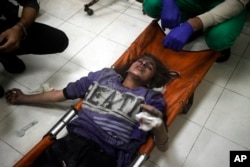An Israeli drone strike Tuesday night on Hamas offices in the Beirut suburbs killed senior Hamas official Saleh al-Arouri, the militant group and Mideast news outlets reported.
Arouri was a senior official in Hamas' politburo and one of the founders of its military wing, the Qassam Brigades, that carried out the deadly shock assault in Israeli territory on Oct. 7. The United States last year offered $5 million for information on him as part of its Rewards for Justice program.
The Israeli military declined to comment on the report, but such an attack would be in line with Jerusalem's avowed intent to kill key Hamas leaders as the war with Hamas in Gaza nears the three-month mark.
"The most important thing to say tonight is that we are focused and remain focused on fighting Hamas," Israeli military spokesperson Rear Admiral Daniel Hagari said when asked about Arouri’s killing.
Arouri headed the Hamas presence in the Israeli-occupied West Bank. Israeli Prime Minister Benjamin Netanyahu had threatened to kill him even before the militant group invaded southern Israel in the October attack.
Lebanon's state news agency reported that four people were killed in the attack on the Hamas offices in a crowded neighborhood in the southern suburbs of the Lebanese capital.
In a statement, Hezbollah said, "this crime will not go unanswered or unpunished," calling it a "dangerous development in the course of the war."
Meanwhile, Israel launched airstrikes throughout the Gaza Strip on Tuesday, as residents reported heavy fighting between Israeli forces and Hamas militants in central and southern Gaza.
Hezbollah, a U.S.-designated terrorist organization, has been launching attacks on Israel since the war against Hamas began in October.
Tuesday's clashes included the Al-Bureij area in the center of the Palestinian enclave and Khan Younis, the southern city that is Gaza's second largest.
Israel's military also reported launching new airstrikes in southern Lebanon targeting Hezbollah militants, allies of Hamas who have exchanged fire with Israeli forces across the border throughout the war in Gaza.
Israel also said it struck "military infrastructure belonging to the Syrian Army" in response to what it said were attacks from Syrian territory targeting Israel.
Syria's state news agency said several Israeli airstrikes hit the outskirts of Damascus and caused "material damage."
Israel has warned that if Hezbollah does not back down, a full-on Lebanon war looms. Both Hamas and Hezbollah are backed by Iran, whose militant allies in Syria, Iraq and Yemen have also been carrying out longer-range attacks against Israel.
Amid the fighting, a significant question remains undecided: How will a postwar Gaza and the Palestinian enclave on the West Bank be governed?
Hamas chief Ismail Haniyeh said Tuesday in a televised address that he is open to a single Palestinian administration to govern war-ravaged Gaza, which has been ruled by Hamas, and the Israeli-occupied West Bank, where the Palestinian Authority runs some government operations.
Haniyeh's position is similar to that of the United States, which favors eventual control of Gaza and the West Bank by the Palestinian Authority, a stance opposed by Netanyahu. The Israeli leader says the Jewish state must control "overall security" in Gaza after the war but left unclear exactly what that would entail.
The United States has stressed that Palestinians must be part of any postwar administration, but the future role of the internationally recognized Palestinian Authority remains unclear.
The Israeli campaign to crush Hamas has left vast parts of the Gaza Strip in ruins. The Health Ministry in Hamas-ruled Gaza said the Israeli offensive has killed more than 22,000 people. The ministry does not differentiate between militants and civilians but says 70% of those killed were women and children.
Israel launched its offensive after the Oct. 7 attack when Israel said about 1,200 people were killed and some 240 captives taken hostage, with 129 believed still held by Hamas or other militants in Gaza. The Israeli military said 174 of its military personnel have been killed so far in the fighting.
Hamas has been designated a terrorist organization by the United States, the United Kingdom, the European Union and others.
About 85% of Gaza's 2.3 million people have been displaced, according to the United Nations. The U.N. has warned of the increased risk of hunger and disease, as desperate families shelter in makeshift tents against the winter cold.
The U.N. Office for the Coordination of Humanitarian Affairs said Rafah governate, located in southern Gaza next to the Egyptian border, is the main refuge for those who have been displaced by intensified fighting and Israeli evacuation orders. There are more than one million people there, “squeezed into an extremely overcrowded space,” the U.N. said.
Some material for this report came from The Associated Press, Agence France-Presse and Reuters.









